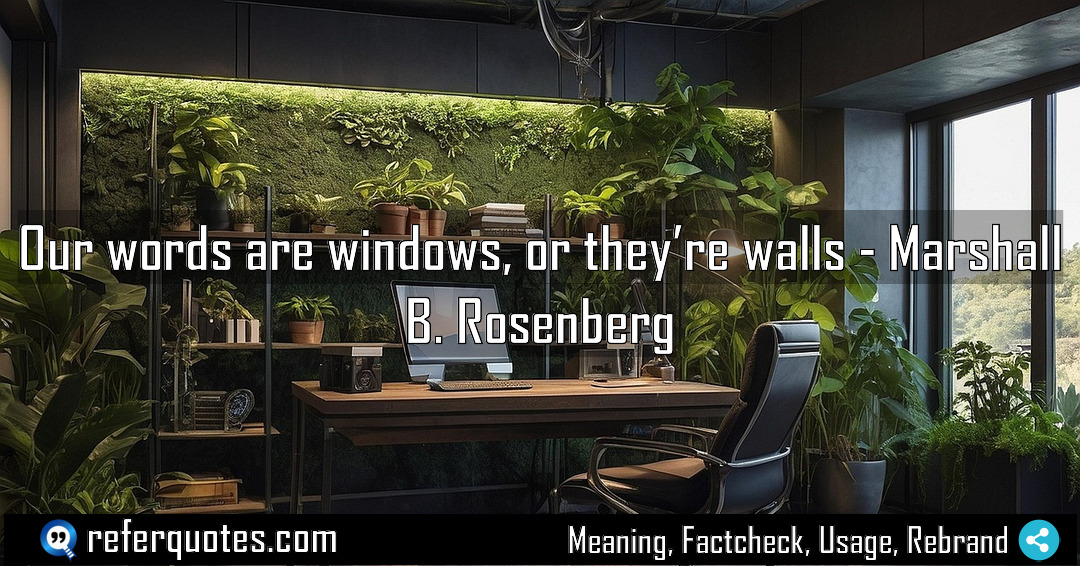
Our words are windows, or they’re walls. This simple idea completely reframes how we communicate. It’s the difference between connecting with someone and creating distance.
Share Image Quote:
Table of Contents
Meaning
Every single thing we say either builds a bridge of understanding or puts up a barrier. There is no neutral ground.
Explanation
Let me break this down for you. When Rosenberg talks about words being windows, he means they allow us to see into our own inner world—our feelings and needs—and invite others to do the same. It’s about vulnerability and clarity. But when words become walls, they shut down the conversation instantly. Think blame, criticism, diagnosis, judgment. I’ve seen it in countless meetings and, honestly, in my own relationships. You say one thing that sounds like an attack, and boom. The other person’s face just closes off. The wall goes up. And real communication stops. It’s not just about being nice; it’s about being effective. Are your words creating an opening or a defense?
Quote Summary
Reading Level70
Aesthetic Score95
Origin & Factcheck
This is straight from Marshall B. Rosenberg’s seminal work, Nonviolent Communication: A Language of Life. The book first came out in the United States in 1999, and this concept is a cornerstone of his entire methodology. You sometimes see similar sentiments floating around, but this specific, powerful phrasing is uniquely his.
Attribution Summary
Where is this quotation located?
| Quotation | Our words are windows, or they’re walls |
| Book Details | Publication Year: 1999; ISBN: 9781892005038; Last edition: 3rd Edition (2015); Number of pages: 264. |
| Where is it? | Preface, Page xv (2015 edition) |
Context
Within the framework of Nonviolent Communication (NVC), this isn’t just a poetic observation. It’s a practical tool. Rosenberg uses this to introduce the four components of NVC: observations, feelings, needs, and requests. Windows are built from these components. Walls are built from everything else—moralistic judgments, demands, and denial of responsibility.
Usage Examples
So, how do you actually use this? It’s a lens for every interaction.
- For Leaders & Managers: Instead of saying “Your report was late and it messed up the entire project” (a wall of blame), try “When I didn’t receive the report by the deadline, I felt anxious because I need reliability to keep the team on track. Can we talk about what happened?” That’s a window. It’s honest and invites a solution.
- In Personal Relationships: “You never listen to me!” is a classic wall. A window would be, “I’m feeling really disconnected right now because I have a need to be heard. Would you be willing to listen to what’s on my mind?”
- For Anyone in Conflict: Before you speak, just do a quick internal check. Ask yourself: Am I building a window or a wall here? Is what I’m about to say going to open up the conversation or shut it down? This single question can change everything.
To whom it appeals?
Share This Quote Image & Motivate
Motivation Score90
Popularity Score100
Shareability Score95
FAQ
Question: Does this mean I can never express anger or frustration?
Answer: Not at all. It’s about *how* you express it. You can say “I am furious because my need for respect wasn’t met” (a window into your feeling and need) instead of “You’re a jerk!” (a wall of judgment). The first one keeps the dialogue alive.
Question: What if the other person keeps building walls?
Answer: That’s the hardest part. You can’t control them, but you can control your own bricks. You consistently choose to build windows through empathy and honest expression. Sometimes, the most powerful thing you can do is just listen and try to see the need behind *their* wall.
Question: Is this just about the words themselves?
Answer: Great question. No, it’s also about the energy and intention behind them. You can say the “right” NVC formula with a sarcastic tone and it’ll still be a wall. The words are the tool, but the genuine intent to connect is the fuel.
Similar Quotes
You know, a compliment given sincerely… it’s one of the most powerful social tools we have. It’s not about flattery; it’s about genuine human connection that can instantly break down…
Even one friendly word can break hours of silence, and that single act can completely shift the energy in a room. It’s a powerful reminder that you don’t need a…
Our defenses shape our reality… it’s a powerful idea, right? It means the walls we build to protect ourselves don’t just keep pain out—they actually change what we see and…
We do not see things as they are… it’s one of those quotes that hits you harder the longer you work with people. It fundamentally explains why two people can…
We protect our illusions as if they were truths because, for a time, they’re just easier. It’s a psychological comfort blanket we all use to avoid facing harsh realities, even…
